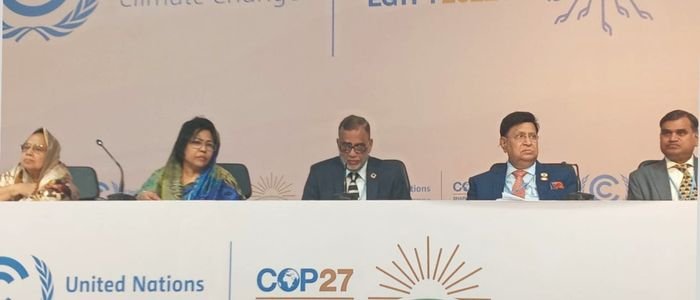Metropolis Special –
Bangladesh has submitted the National Adaptation Plan (NAP) in the ongoing COP27 with a total of 113 actions, identified for 8 vulnerable sectors. For this, a total of 230 billion US dollars will be required for the next 27 years from 2023-2050 – told in a press briefing by a Bangladesh delegation yesterday (14th November) at 4 PM local time in Sharm-El Sheikh, Egypt.
The session was led by Md. Shahab Uddin MP, Honorable Minister of Environment, Forest, and Climate Change, along with Dr. AK Abdul Momen MP, Honorable Minister of Foreign Affairs. Among others, Habibun Nahar MP, Honorable State Minister of Environment, Forest, and Climate Change, Saber Hossain Chowdhury MP, Chairman of the Parliamentary Standing Committee on Ministry of Environment, Forest, and Climate Change, Dr. Farhina Ahmed, Secretary at the Ministry of Environment, Forest, and Climate Change, were also present during the session.
During the press briefing, it was mentioned that Bangladesh has received recognition for her wider adaptation experience despite being the 7th most vulnerable country in the world. Global Commission on Adaptation (GCA) has awarded Bangladesh on Locally Led Adaptation (LLA) along with 3 other countries.
Bangladesh has underscored the need of putting the following key issues in the (cover) decisions of COP27 and CMA4:
-
Addressing the gap that exists between NDCs and emission reductions required by the science to keep the 1.5-degree Celsius target alive, including finalizing the mitigation work program as necessary to reduce global carbon emission by 45 percent by 2030
-
ensuring the mobilization and providing 100 billion US dollars each year from this year to 2025, finalizing the definition of climate finance, and achieving substantial progress on New Collective Quantified Goal (NCQG) on climate finance for post-2025
-
Urge the developed countries to at least double their collective provision of adaptation finance by 2025 as agreed during COP 26, and provide support for the implementation of the National Adaptation Plan
-
Establishment of a financing mechanism for averting, minimizing, and addressing loss and damage.
Talking about the success of ongoing negotiations, the delegates mentioned, “Bangladesh feels disappointed with the progress on agenda items on climate finance. The commitment of developed countries to provide 100 billion US dollars per year has not been met yet, and we have strong reservations about the methodology of calculation of climate financing.”
Bangladesh has urged the Standing Committee on Finance (SCF) to fix a common definition of climate finance on an urgent basis. It is also important for the discussion of the New Collective Quantified Goal (NCQG) of climate finance.
The delegates also mentioned, “The quantity and quality of adaptation finance are far from our expectation. More than 70 percent of the generated fund is provided as loans and a significant portion of that is provided at the prevailing market rate. In the name of climate finance, if the current trend of the flow of finance continues, it may create a new debt burden for vulnerable developing countries, particularly the LDCs. We are strongly in favor of a balanced allocation between adaptation and mitigation and grant-based financing for adaptation in line with the Paris Agreement decision.”
Bangladesh has strongly urged developed countries to fulfill their commitment of 100 billion US dollars as well as doubling adaptation financing to address the climate change impacts, particularly for vulnerable countries.
Bangladesh has also urged that Green Climate Fund (GCF), Least Developed Countries Fund (LDCF), Adaptation Fund (AF), and Global Environment Facility (GEF) Trust Fund should be strengthened with adequate resources and access to those funds should be quick and easy.
Bangladesh is going to adopt a Mitigation Work Program (MWP) for achieving the 1.5-degree Celsius temperature goal since this is a question of survival for the nation. The press briefing continued as, “If the current global emissions continue to grow, we will soon reach a tipping point where no adaptation and resilience measures will work to protect us.”
Bangladesh urged to see an effective work program with the following key principles and elements:
-
Reflection of urgency to scale up mitigation ambition and implementation in this critical decade to reach the Paris Agreement Temperature Goal, particularly 1.5 degree Celsius
-
The relevant principles and provisions of the Convention and the Paris Agreement, particularly the provisions set out in the Glasgow Climate Pact will be the principal basis in carrying out the MWP as well as aligning mitigation actions with the findings of the latest science;
-
The MWP should facilitate the mobilization of resources for the implementation of concrete and practical mitigation actions with the participation of potential funding entities, investors, and implementers on the ground.
Under the 2-year Glasgow – Sharm El Sheikh Work Programme on Global Goal on Adaptation (GGA) agenda item, Bangladesh thinks that the progress is very slow. Parties discussed on a framework to develop the elements and criteria for developing the global goal on adaptation during 2023 and reach a decision on GGA during COP 29. Parties also discussed on the sectors and areas for the 4 workshops, which will be conducted during 2023.
In case of Loss and Damage, the structure and the institutional architecture of the Santiago Network for loss and damage with an advisory board and an independent secretariat to catalyze the technical assistance are expected to be agreed upon.
Bangladesh hopes that discussions to establish a dedicated financial entity no later than 2024 to address loss and damage will be adopted at COP 27.



